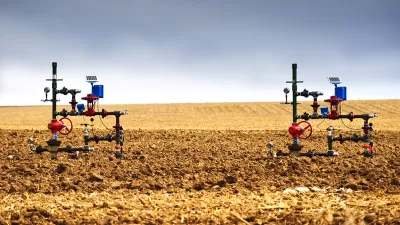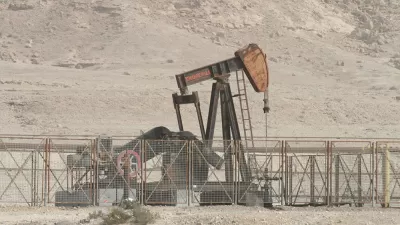A one-year suspension of an Obama-era rule to reduce methane emissions from oil and gas drilling on Federal and Indian lands will increase global warming and reduce federal revenue. Trump took action after Congress failed to repeal the rule.

"After Congress narrowly voted against repealing the BLM rule [last May], Interior [Department] decided to take action itself," adds Dino Grandoni in a Washington Post energy analysis on Dec. 7.
"According to federal estimates, the rule would prevent roughly 180,000 tons a year of methane from escaping into the atmosphere and would boost federal revenue between $3 million and $13 million a year because firms only pay royalties on the oil and gas they capture and contain," reported The Washington Post via Planetizen on May 12 after the U.S. Senate vote.
On Dec. 8, the Federal Register announced that the "Bureau of Land Management (BLM) is promulgating a final rule (2017 final delay rule) to temporarily suspend or delay certain requirements contained in the rule published in the Federal Register on November 18, 2016, entitled, “Waste Prevention, Production Subject to Royalties, and Resource Conservation” (2016 final rule) until January 17, 2019."
The rule's suspension is being litigated by Earthjustice in a lawsuit [pdf] against Interior Secretary Ryan Zinke on behalf of many environmental and natural resource organizations.
Natural gas and oil industry steps in to monitor itself
In the absence of Federal regulations on methane leaks on Federal and Indian lands, the American Petroleum Institute has launched their own voluntary initiative.
"Focused initially on reducing methane and volatile organic compound (VOC) emissions, the Environmental Partnership includes 26 natural gas and oil producers, who produce a significant portion of American energy resources," states their Dec. 5 news release. "Participating companies will begin implementing the voluntary program starting January 1, 2018."
The Environmental Partnership is a historic agreement bringing together American natural gas and oil companies of all sizes to take action, learn and collaborate in an effort to further improve our environmental performance.
But the industry's initiative was about as well-received by The Wilderness Society as the rule's suspension, writes Fears.
“It is inexcusable that the BLM is suspending this rule without putting a new rule in place, because it means that the federal government has decided to leave oversight of methane waste and pollution to the states for the indefinite future,” said Chase Huntley, a program director for energy and climate at the Wilderness Society.
Huntley was also suspicious of the industry’s attempt to regulate itself. “It’s somewhat amazing that the industry hasn’t already put forward its own standard,” he said.
FULL STORY: Trump will suspend a rule to limit a pollutant far worse than carbon dioxide

Planetizen Federal Action Tracker
A weekly monitor of how Trump’s orders and actions are impacting planners and planning in America.

Congressman Proposes Bill to Rename DC Metro “Trump Train”
The Make Autorail Great Again Act would withhold federal funding to the system until the Washington Metropolitan Area Transit Authority (WMATA), rebrands as the Washington Metropolitan Authority for Greater Access (WMAGA).

The Simple Legislative Tool Transforming Vacant Downtowns
In California, Michigan and Georgia, an easy win is bringing dollars — and delight — back to city centers.

The States Losing Rural Delivery Rooms at an Alarming Pace
In some states, as few as 9% of rural hospitals still deliver babies. As a result, rising pre-term births, no adequate pre-term care and harrowing close calls are a growing reality.

The Small South Asian Republic Going all in on EVs
Thanks to one simple policy change less than five years ago, 65% of new cars in this Himalayan country are now electric.

DC Backpedals on Bike Lane Protection, Swaps Barriers for Paint
Citing aesthetic concerns, the city is removing the concrete barriers and flexposts that once separated Arizona Avenue cyclists from motor vehicles.
Urban Design for Planners 1: Software Tools
This six-course series explores essential urban design concepts using open source software and equips planners with the tools they need to participate fully in the urban design process.
Planning for Universal Design
Learn the tools for implementing Universal Design in planning regulations.
Smith Gee Studio
City of Charlotte
City of Camden Redevelopment Agency
City of Astoria
Transportation Research & Education Center (TREC) at Portland State University
US High Speed Rail Association
City of Camden Redevelopment Agency
Municipality of Princeton (NJ)




























